The first in a new series where I pick a random actor and discuss some of their performances in the crime fiction universe that I particularly love. I couldn’t think of a better candidate for the inaugural newsletter than one Patrick Joseph McGoohan (1928-2009). Welcome to the McGoon Squad!1
Patrick McGoohan, quadruple threat of actor, director, producer, and writer, was one of the most well-known Irish actors of the twentieth century, despite the fact that he was born in my old neighborhood of Astoria, Queens! He got his start as the titular secret agent on the British TV series Danger Man, and had roles in over thirty films, including Scanners and Braveheart. But my favorite McGoohan performances are squarely in the world of crime fiction. Here are a few to check out:
Columbo (the ‘70s)
McGoohan was in no fewer than four episodes of the classic episodic detective series starring Peter Falk, and won Emmys for two of them. If you’ve never seen Columbo, the murder is committed, and therefore the murderer revealed, in the opening moments of the show. Therefore, the pleasure comes in watching Falk’s Detective Columbo basically annoy the suspect over the course of a good 70-120 minutes until they confess based on circumstantial evidence that would never hold up in a court of law! It’s fantastic, and one of the inspirations for the Rian Johnson “case of the week” series Poker Face. McGoohan appeared as the villain more times than any other actor, and nobody plays annoyed better than him. He also directed five episodes of the series, including three of the ones in which he appeared Of those four, I would recommend “By Dawn’s Early Light” for two reasons: it’s the first performance for which McGoohan won an Emmy for his role as the commandant of a military academy who murders the chairman of the board, and the episode was filmed on the campus of The Citadel in Charleston, South Carolina, where I spent a very interesting academic year as a Visiting Assistant Professor.
The Scarecrow of Romney Marsh (1963)
Perhaps a bit more of a deep cut? This text was both a three-part miniseries on Walt Disney’s Wonderful World of Color and released as a film. In it, McGoohan plays a Zorro/Robin Hood/Batman type who by day is Dr. Syn, the vicar in a small town near Dover on the southeastern England coast, and by night The Scarecrow, who smuggles goods under the nose of George III2 and his army to help the villagers bear the burden of the king’s repressive taxes. The adventures in each episode are fun to watch as McGoohan’s vicar calmly plays three-dimensional chess to outwit the antagonist General Pugh in drawing rooms and churches, and then absolutely wilds out as the Scarecrow with a maniacal laugh and the most haunting mask this side of Michael Myers.
And it’s not even the scariest one on the show. Behold, if you dare, the disguise of Syn’s accomplice “Hellspite.”
Overall, it’s very much a Disney show: not a lot going on in terms of sophisticated analysis and there is a good bit of “the colonies are the land of freedom” rhetoric that I doubt appeared in the original novels, but it is obvious in every scene that McGoohan is giving a performance. He’s also the hottest guy in the Romney Marsh by a lot.
The Prisoner (1967-68)
I don’t know what to say about this show except that it is one of the most daring, bizarre, complicated, and entertaining series I’ve ever seen. There is no Twin Peaks without The Prisoner. I might have been Prisoner-pilled, but now I see its influence everywhere, which is pretty impressive for a single season of only seventeen episodes.
This show was McGoohan’s baby, as he created and executive produced the show, directed several episodes, and wrote the final two. It’s hard not to argue that The Prisoner is basically the psychobiography of Patrick McGoohan as illustrated through a show about an unnamed secret agent (shades of Danger Man) who is kidnapped by unknown forces and transplanted into a pastoral English “village” that is Kafkaesque in its operation, and absolutely flawless in its style.
The episodes trace the attempts of Number Six (the designation he is assigned and refuses to accept) to resist increasingly Orwellian attempts to extract nebulous “information” from him, escape the false paradise of the village, and ultimately to destroy its totalitarian institutions and structures. It might be a stretch to call The Prisoner “crime fiction,” but the show is so committed to exposing the instability, inefficacy, and outright menace of concepts like “legal” and “illegal,” not to mention sanity and insanity, freedom and imprisonment, structure and chaos, and ultimately identity itself, that I feel it has a home in many genres, as well as none at all.3
The Prisoner is one of those texts, like The Sound and the Fury, that I wish I had the pleasurable and exhilarating disorientation of experiencing again for the first time. Being surprised is becoming a vanishingly rare experience in the contemporary media landscape, and I would encourage anyone who enjoys mysteries, dystopias, meditations on the idea of Britishness, experiments in televised storytelling, 60s counterculture, or existential angst to take a deep dive into The Prisoner. I’ll be here on the other side to endlessly discuss!
As charismatic and compelling a presence I find McGoohan on screen, it seems in person he could be a bit . . . prickly? Conservative? Weird about women? For an excellent argument exploring how McGoohan’s biography, particularly his staunch Catholicism, might have impacted the themes of the show, and how his public remarks illuminate and complicate its representation of religious and civic institutions, check out “How the Prisoner Allegorizes Patrick McGoohan’s Relationship to God” written by a brilliant friend of the ‘stack. But! Save it until after you’ve watched the series in its entirety, as the piece discusses the series’s epic, surrealist, and deeply moving concluding episodes.
Too cringe?
I miss no opportunity to share Janet Malcolm’s warning from The Journalist and the Murderer that classifications always offer false clarity: “as if labelling were ever anything more than the restatement of a problem.” One way to think about The Prisoner is as seventeen ways of restating a problem (pace Wallace Stevens).

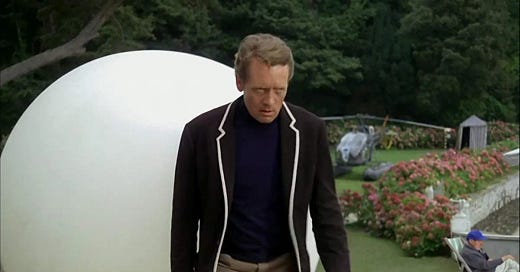


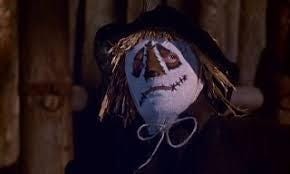
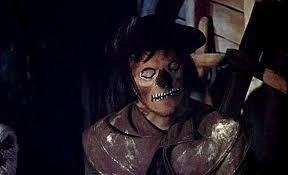

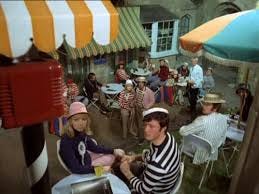
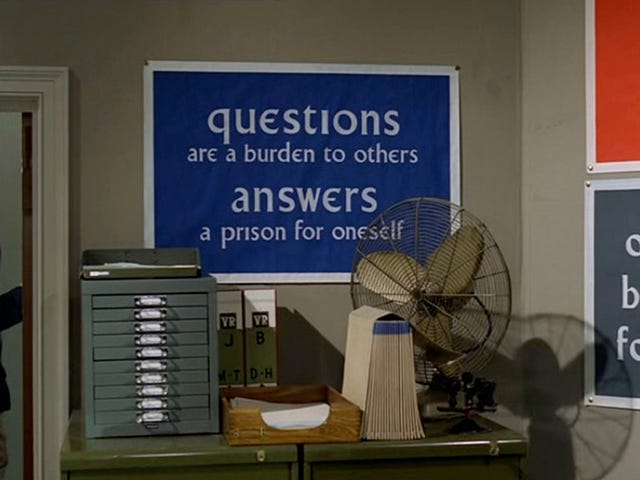
Top idea for a series of newsletter, Tracy! I loved The Prisoner when I was a young lad. You are right to point out the connection to Twin Peaks. I can't think of a more innovative show than those two. Have you seen the McGoohan interview where he says something like 'Of *course* Number Six was danger Man! We just weren't allowed to use the name'? I can't remember where I saw it but it cleared up some confusion for me!
Love, love, love all of those. "McGoohan appeared as the villain more times than any other actor, and nobody plays annoyed better than him." Yes! What about him playing the evil art dealer in Silver Streak?